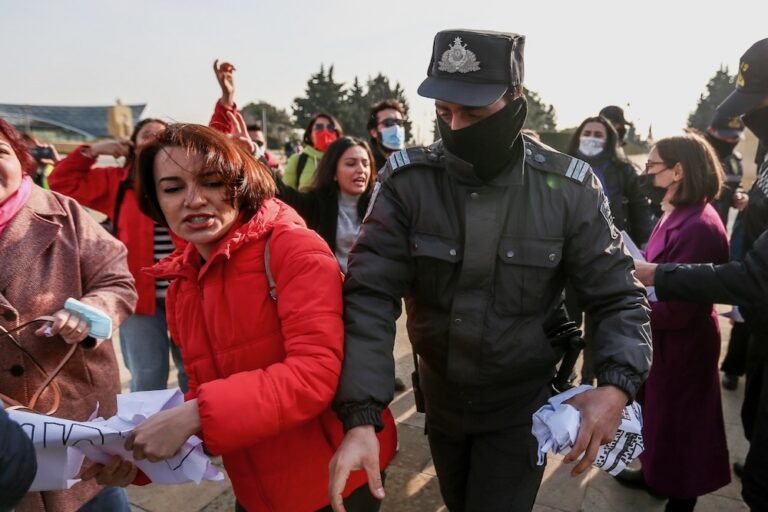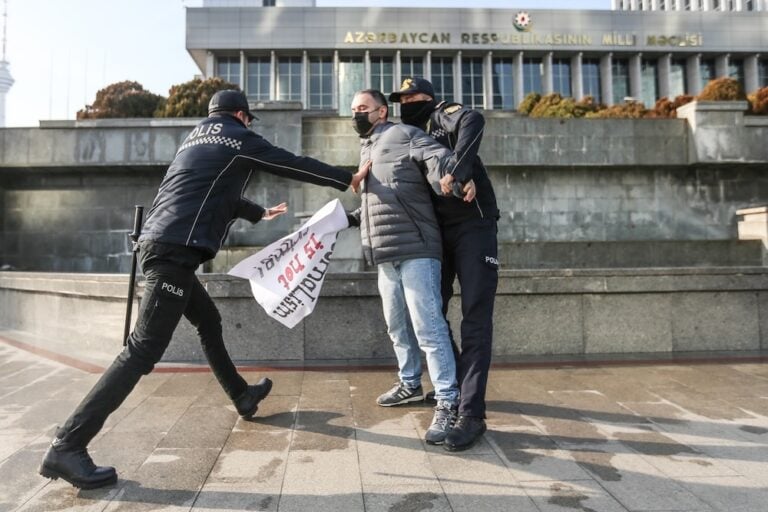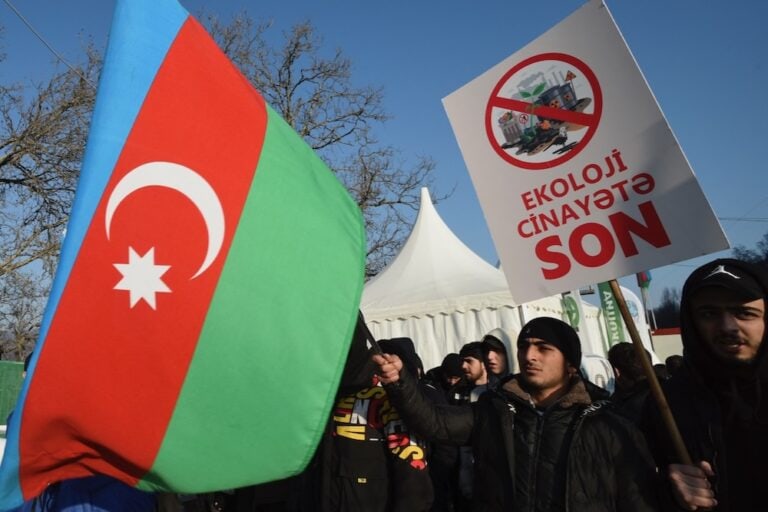(RSF/IFEX) – RSF has called on the Parliamentary Assembly of the Council of Europe (PACE) to firmly condemn Azerbaijan for tolerating escalating press freedom violations. On 5 October, at its autumn session, PACE will examine to what extent Azerbaijan has fulfilled its commitments to the Council of Europe, including guaranteeing press freedom. In its 20 […]
(RSF/IFEX) – RSF has called on the Parliamentary Assembly of the Council of Europe (PACE) to firmly condemn Azerbaijan for tolerating escalating press freedom violations.
On 5 October, at its autumn session, PACE will examine to what extent Azerbaijan has fulfilled its commitments to the Council of Europe, including guaranteeing press freedom.
In its 20 September report on the country’s democratic institutions, PACE pointed out that journalists linked to the opposition have suffered a steep deterioration in their working conditions in the past year.
“We urge PACE to strongly condemn the inertia of the Azerbaijan authorities in the face of press freedom violations,” said RSF in a letter to Assembly President Peter Schieder.
“Those who physically attacked journalists during the disturbances that followed the October 2003 presidential elections must be punished as must those who attacked two opposition journalists in July 2004,” said the organisation.
“The authorities must condemn these actions and do everything possible to put an end to the climate of impunity that has taken hold over the past year,” it added.
“Articles 147.2 and 148 of the Criminal Code providing for jail terms for defamation and insult should be repealed. The fear of being sent to prison or suffering severe fines pushes journalists into a generalised self-censorship that is very damaging to press freedom.”
“We also call for the release of Rauf Arifoglu, editor-in-chief of the leading opposition daily, “Yeni Musavat”, and vice-president of the opposition Musavat party, who has been held in custody without justification for one year,” it concluded (see IFEX alerts of 6 August, 23 June, 17 February and 23 January 2004, 10 and 2 December, 24 November, 30, 27, 24 and 22 October 2003).
Nearly 100 journalists were victims of physical assault in 2003. More than 50 were attacked covering violent clashes between the security forces and demonstrators on 15 and 16 October 2003, the day after presidential elections.
Two opposition journalists were attacked in July 2004. On 17 July, Aydin Gouliev, editor of the opposition daily “Baki Khaber”, was abducted and beaten by four unknown assailants. His attackers accused him of “not serving his country and Islam” and warned him to stop all journalistic work (see alert of 19 July 2004). Eynulla Fatullayev, of the opposition weekly “Monitor” was brutally beaten on the head in a Baku street on 26 July. He has written many articles highly critical of the government. Despite President Ilham Aliev’s promises to find and punish those who carried out the attacks, the investigation has gone nowhere.
Numerous press freedom violations stemmed from criminal defamation and insult laws carrying prison terms.
On 25 February, a Baku court handed down a two-year suspended sentence to Rovshan Kebirli, editor of the daily “Mukhalifat”, and journalist Yusif Gambar over an article defaming the national Taekwondo federation. The article, which appeared in the paper’s 18 October 2003 edition, accused members of the federation of joining security forces in breaking up demonstrations in Baku contesting the results of the 15 October presidential elections (see alert of 26 February 2004).
On 30 August, Gouliev was given a one-year suspended prison sentence for defamation and insult to Jalal Aliev, the head of state’s uncle.
Elsewhere, exorbitant fines handed down to media outlets have put numerous publications at risk of being forced out of business. Opposition daily “Yeni Musavat” faces possible closure after receiving fines totalling almost 25,000 euros (approx. US$31,000) over the course of six trials.
On 22 September, Elmar Huseynov, founder and editor-in-chief of the opposition weekly “Monitor”, and journalist Tarlan Mamedzade, who wrote an article in March criticising the behaviour of deputies, were fined about 6,500 euros (approx. US$ 8,000) for “insulting the name and dignity” of ruling party deputy Siyavush Novruzov. “Monitor”‘s management have appealed the sentence. The paper now faces a second defamation case brought by Member of Parliament Zalimkhan Yagub for a 3 July article criticising deputies. Yagub, who was not named in the article, has called for the closure of the weekly and for Huseynov and Fatullayev, who wrote the article, to be jailed and fined 25,000 euros.
Fatullayev was arrested at Baku airport on 23 September on his way to Moscow. Police cited an order from the prosecutor general’s office banning the journalist from leaving the country. He was released and allowed to board his Moscow flight a few hours later. The Russian-language “Monitor” is known for its fiercely critical stance towards Azeri government policy.
Finally, Arifoglu, editor-in-chief of the leading opposition daily, “Yeni Musavat”, and vice-president of the opposition party Musavat, has been imprisoned in Baku since 27 October 2003. His trial and that of six other opposition leaders opened on 7 May 2004. Arifoglu is accused of organising rioting that shook the country after the contested 15 October 2003 presidential elections. He faces charges of “disturbing the peace” and “refusing to comply” with official decisions, which carry a possible seven year prison term.


